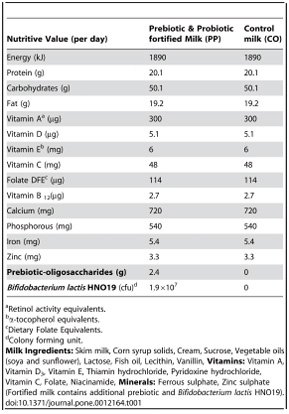
A RECENT study on the effects of synbiotics, a combination of probiotics and prebiotics, used to fortify milk suggests that daily consumption may reduce childhood illness and morbidity. Common infectious diseases continue to be a major cause of death among preschool children in developing countries, and identification of feasible strategies to combat this disease burden is an important public health need, the authors said in the study published in the open journal PLoS ONE.
Milk containing prebiotic oligosaccharides and Bifidobacterium lactis HN019 reduced respiratory infections by 35%, and reduced the days of severe illness and fever by 16 and 5 per cent, respectively, according to a community-based, double-blind, randomised controlled trial conducted in New Delhi.
Researchers from Annamalai University in India and Johns Hopkins University in the United States evaluated the efficacy of adding prebiotic and probiotic to milk, in preventing diarrhoea, respiratory infections and severe illnesses, in children aged 1-4 years as part of a four-group study design.
The 624 children were randomly assigned to receive either control milk or the same milk fortified with B. lactis HN019 (1.9?07 colony forming units per day) and prebiotic oligosaccharides (2.4g per day). Both study groups were comparable at baseline; compliance to intervention was similar, the researchers said.
Fonterra Brands (Singapore) Pte. Ltd. provided fortified and control milk powder (see composition in the Table) packed into 32g single-serve sachets that were reconstituted before feeding. Both groups received 21 sachets weekly, with an advice to consume three sachets a day.
The children were followed for one full year, with bi-weekly household surveillance conducted to gather information on compliance and morbidity. Following the one-year intervention, the researchers observed significant reductions in the incidence of dysentery (21%), pneumonia (24%), and severe acute lower respiratory infection (35%) in the children receiving the fortified milk, compared with the control group.
揗ilk can be a good medium for delivery of prebiotic and probiotic and resulted in significant reduction of dysentery, respiratory morbidity and febrile illness. Overall, impact of diarrhoea was not significant," the researchers concluded, adding that the findings need confirmation in other settings.(The end)
Sazawal S, Dhingra U, Hiremath G, Sarkar A, Dhingra P, et al. (2010) Prebiotic and Probiotic Fortified Milk in Prevention of Morbidities among Children: Community-Based, Randomised, Double-Blind, Controlled Trial. PLoS ONE 5(8): e12164. doi:10.1371/journal.pone.0012164Highsnobiety Sneakers

 iConnectHub
iConnectHub
 Login/Register
Login/Register Supplier Login
Supplier Login



























